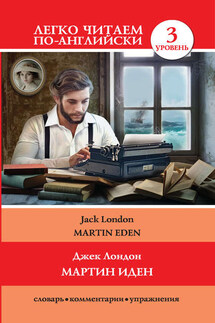Мартин Иден / Martin Eden - страница 10
The days were too short. There was so much he wanted to study. He cut his sleep down[67] to five hours.
In the meantime the weeks were passing, his money was coming out, and there was no money coming in. A month after the adventure story for boys was returned to him by THE YOUTH’S COMPANION. The SAN FRANCISCO EXAMINER did the same: at the end of the fifth week the manuscript came back to him, by mail, without comment. In the same way his other articles came back from the other leading San Francisco papers. When he recovered them, he sent them to the magazines in the East, from which they were returned more promptly.
The short stories were returned in similar fashion. He read them over and over, and liked them so much that he could not understand the cause of their rejection. He decided to read some stories to his sister.
“That story was perfectly grand,” she announced; “but it makes me sad. I want to cry. There is too many sad things in the world anyway. It makes me happy to think about happy things. Where are you going to sell it?”
“Hm, that’s not so easy,” he laughed.
“But if you DID sell it, what do you think you’d get for it?”
“A hundred dollars.”
“Oh! I do hope you’ll sell it!”
“Easy money, eh?” Then he added proudly: “I wrote it in two days. That’s fifty dollars a day. But nobody wants to publish them.”
He wanted to read his stories to Ruth, but did not dare.
Chapter 12
It was the circle of socialists and working-class philosophers that gathered in the City Hall Park[68] on warm afternoons that was responsible for the great discovery. Once or twice in the month, Martin listened to the arguments. The tone of discussion was much lower than at Mr. Morse’s table. The men were not grave and dignified. They lost their tempers easily.[69]
They spoke about Herbert Spencer[70] in the park. So the great discovery began. Martin tried to read Spencer, and chose the “Principles of Psychology” to begin with. But he did not understand the book, and he returned it unread.
Martin Eden was very curious, and he wanted to know. This desire had sent him to travel around the world. He tried to read Spencer again. But his ignorant and unprepared attempts at philosophy had been fruitless. The medieval metaphysics of Kant[71] had given him the key to nothing. And here was the man Spencer, organizing all knowledge for him, reducing everything to unity, elaborating ultimate realities, and presenting to him a concrete universe. There was no caprice, no chance. All was law.
What most profoundly impressed Martin, was the correlation of knowledge – of all knowledge. He had been curious to know things. All things were related to all other things from the star in space to the myriads of atoms in the grain of sand[72] under one’s foot. This new concept was a perpetual amazement to Martin.
One day, because the days were so short, he decided to give up algebra, geometry, and trigonometry. Then he cut chemistry from his study-list, retaining only physics.
“I am not a specialist,” he said to Ruth. “Nor am I going to try to be a specialist. There are too many special fields for any one man, in a whole lifetime, to master them. I must pursue general knowledge. When I need the work of specialists, I shall refer to their books. It is unnecessary to have this knowledge.”
“Give me time,” he said aloud. “Only give me time.”











